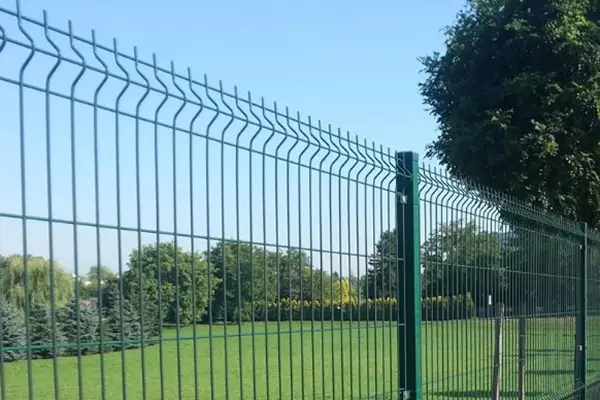A welding mesh fence is popular for residential and commercial properties due to its strength, durability, and security benefits. These fences are made from welded wire mesh panels that provide a robust barrier, making them suitable for a wide range of applications, from protecting private property to securing industrial sites. However, one common question when considering a welded mesh fence is, “How long does it last?”
The lifespan of a welding mesh fence can vary significantly based on several factors. In this article, we explore the key elements that affect the durability of a welding mesh fence’s durability and estimate how long it might last under different conditions.
Factors Affecting the Lifespan of a Welding Mesh Fence
- Material Used
- The material from which the welding mesh fence is made plays a significant role in its longevity. Common materials include:
- Galvanized Steel: This is one of the most common materials for welded mesh fences. Steel is known for its strength and ability to withstand impact, but the galvanized coating (zinc coating) protects it from rust and corrosion. A well-maintained galvanized steel fence can last anywhere from 15 to 30 years.
- Stainless Steel: Stainless steel is more resistant to rust and corrosion than galvanized steel, making it ideal for areas with high humidity or coastal environments. A stainless steel welding mesh fence can last 30 years or more with proper care.
- Powder-Coated Steel: This is steel that has been coated with a powder-based paint. The powder coating provides an extra layer of protection against weathering and corrosion. Depending on the quality of the coating, a powder-coated fence can last between 10 to 20 years.
- The material from which the welding mesh fence is made plays a significant role in its longevity. Common materials include:
- Environmental Conditions
- The environment in which the fence is installed plays a huge role in determining its lifespan.
- Climate: Areas with high humidity, saltwater exposure (such as coastal regions), or heavy rainfall can accelerate corrosion. In such environments, a galvanized or stainless steel fence will last longer than a regular steel fence. In contrast, in dry climates with low moisture, a mesh fence will be exposed to fewer elements that cause wear and tear.
- Temperature Fluctuations: Extreme temperature changes, particularly freezing and thawing cycles, can cause expansion and contraction of the materials, potentially weakening the structure over time.
- The environment in which the fence is installed plays a huge role in determining its lifespan.
- Maintenance and Care
- Regular maintenance is key to prolonging the life of a welding mesh fence. A well-maintained fence can last much longer than one that is neglected.
- Cleaning: Removing dirt, debris, and plant growth from the fence will help to prevent damage to the coating and allow for early detection of issues like rust or corrosion.
- Repainting/Coating: For fences with a painted or coated finish, periodic re-coating can help protect against rust and environmental damage. For galvanized steel fences, if the zinc coating starts to wear off, it can be re-galvanized to restore its protective properties.
- Repairs: If any part of the fence becomes damaged, such as a bent panel or a loose weld, it’s important to repair it promptly. Even a small issue can compromise the integrity of the entire fence if left unchecked.
- Regular maintenance is key to prolonging the life of a welding mesh fence. A well-maintained fence can last much longer than one that is neglected.
- Installation Quality
- The quality of installation plays a crucial role in how long a fence will last. A poorly installed fence may have weak spots that become more prone to wear over time. Proper installation, including securing the fence posts deep into the ground and ensuring the mesh is tightly attached, will reduce the chances of structural failure.
- Usage and Impact
- The level of physical stress the fence experiences can also influence its lifespan. For example, a mesh fence in a residential area may experience less impact than a fence around an industrial property, which may be subject to more frequent collisions, vibrations, or other stresses. Similarly, animals or pests can cause damage to the mesh or posts, potentially reducing its lifespan.
Estimated Lifespan of a Welding Mesh Fence
Based on the factors outlined above, here is a general guideline for the lifespan of welding mesh fences under different conditions:
- Galvanized Steel Mesh Fences: 15 to 30 years (with regular maintenance and in moderate climates)
- Stainless Steel Mesh Fences: 30+ years (ideal for coastal or harsh environments)
- Powder-Coated Steel Mesh Fences: 10 to 20 years (depending on the quality of the coating and maintenance)
- Mild Steel Mesh Fences: 5 to 10 years (without coating or in areas with high corrosion risk)
Conclusion
A welding mesh fence can last anywhere from 5 to 30 years or more, depending on several factors including the type of material, environmental conditions, maintenance practices, and installation quality. Galvanized and stainless steel fences tend to have the longest lifespans, especially when installed and maintained properly. To maximize the longevity of a welding mesh fence, it’s essential to conduct regular inspections, clean it periodically, and address any signs of damage or corrosion early on. By doing so, you can ensure that your fence continues to provide reliable security and protection for many years.
Post time: Nov-25-2024
















